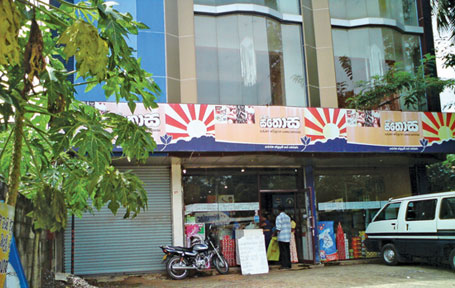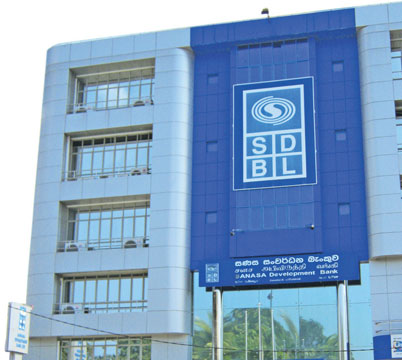|
2012 - the International Year of Co-operatives:
Co-operatives, a global economic force
By Pramod DE SILVA
"Co-operatives are a reminder to the
international community that it is possible to pursue both economic
viability and social responsibility."
- United Nations Secretary-General Ban
Ki-moon
Have you visited your local co-operative store lately? In Sri Lanka
that would include more than 200 Sathosa (Co-operative Wholesale
Establishment) outlets as well as local co-op stores in all parts of the
island.
 |
|
A Sathosa outlet |
Incidentally, the Co-operatives Movement in Sri Lanka is exactly 100
years old and is very close to the people especially in the rural areas.
A drive is under way in Sri Lanka to enrol more than 300,000 members to
all co-operative societies. It is worth paying a visit to your local
co-op and becoming a member.
What exactly is a co-operative? As the name implies, co-operatives
are business enterprises owned and controlled by the members that they
serve. A co-operative, according to the UN, is “an autonomous voluntary
association of people who unite to meet common economic, social and
cultural needs and aspirations, through a jointly owned and
democratically controlled enterprise”.
Self-help, social responsibility and equality, democratic and
participatory approach and concern for community – these are the main
values and principles that underlie co-operatives. Their member-driven
nature differentiates them from other forms of business into taking
decisions balanced by the pursuit of profit with the needs and interests
of members and their communities. Thus shopping at a co-op store
benefits not only the consumer per se, but also the entire community,
being a collective enterprise that boosts the local economy.
Credit grants
However, co-operatives need not necessarily focus on consumer goods.
There are many co-operatives that grant credit to their members – Sri
Lanka’s Sanasa Bank is an example. Sanasa is a Sinhala acronym for
Co-operative Credit Society.
There are co-operatives that focus on education, transport and
travel, agriculture, housing, fisheries, small and medium enterprises,
health and hospitals, youth, insurance and rural development. Some
co-operatives are called multi-purpose, because they deal with many of
these needs. Co-operatives also play an important role in peace building
and bridging ethnic divides.
Globally, there are more than one billion co-operative members in
over 100 countries. That makes at least one in seven people a member of
a co-operative. The Movement is believed to be among the fastest growing
segments of the world economy.
 Co-operatives all over the world will be under the spotlight this
year, which has been designated by the UN as the International Year of
Co-operatives. Co-operatives all over the world will be under the spotlight this
year, which has been designated by the UN as the International Year of
Co-operatives.
Its aim is to increase awareness on co-operatives and promote the
movement's successes and ideals of international solidarity, economic
efficiency, equality, and world peace.
It will also focus on the contribution of co-operatives to
socio-economic development, particularly their impact on poverty
reduction, employment generation and social integration.
Events in this connection are organised worldwide by the
International Co-operatives Alliance (ICA), Committee for the Promotion
and Advancement of Co-operatives (COPAC), the United Nations and its
various agencies.
There will be two main conferences and seminars that celebrate the
Co-operatives Year. One will be held in England, the other in Canada.
The Co-operatives World Festival and Expo will be held in Manchester,
England from October 29 to November 2. The International Summit of
Co-operatives will be held in Quebec, Canada from October 8 to 11.
It will focus on the Amazing Power of co-operatives, with six
groundbreaking studies analysed.
Growth, establishment
These parleys will focus extensively on the theme for the
Co-operatives Year:“Co-operative Enterprises Build a Better World”. With
this theme, the UN also seeks to encourage the growth and establishment
of co-operatives all over the world. It also encourages communities and
governments to recognise the role of co-operatives in helping to achieve
internationally agreed upon development goals, such as the Millennium
Development Goals.
 |
|
Sanasa Bank |
“Co-operatives create, improve and protect the income and employment
of their members and contribute to poverty reduction. Co-operatives
support and promote small and medium enterprises in many sectors. This
is how co-operatives can help create a better world,” said Felice
Llamas, spokesman on co-operatives for the UN Department of Economic and
Social Affairs.
“With their participatory and democratically based approach,
co-operatives help empower women, youth, people with disabilities, older
persons and indigenous peoples, thus promoting an inclusive society.
These are all factors that help create a better world.
The world faces unstable financial systems and increased food
insecurity, growing inequality and rapid climate change and environment
degradation. Co-operatives offer a compelling model of economic
enterprise that is relevant to today’s challenges,” he said.
While co-operatives are essential for developing countries, their
role gets heightened attention in times of crises such as natural
disasters. This was evident during the Indian Ocean tsunami of 2004. In
fact, economic and social hardship is behind the very genesis of
co-operatives.
“Historically, co-operatives have found their genesis in times of
economic hardship,” said Sha Zukang, United Nations
Under-Secretary-General for Economic and Social Affairs and
Secretary-General of “Rio+20”, the United Nations Conference on
Sustainable Development.
“This is a testament to their capacity to alleviate the effects of
such crises. In fact, in the wake of the 2008-2009 global financial and
economic crisis, financial co-operatives proved to be more resilient
than their investor-owned counterparts.”
Co-operatives are a global economic force in their own right. In its
2008 Global 300 report on the largest co-operatives in the world, the
International Co-operative Alliance, a non-profit group with 260 member
organisations from 96 countries representing over one billion
individuals, indicated that the top 300 co-operatives had an aggregate
turnover of $1.1 trillion, comparable to roughly one-tenth of the gross
domestic product (GDP) of the United States. Most of the 300 largest
co-operatives are found in the developed economies of France, Germany,
Japan, the Netherlands and the United States, with 30 percent engaged in
the agriculture and food sectors, 23 percent in retailing, 22 percent in
insurance and 19 percent in banking.
Prominent role
In developing countries, co-operatives play an even more prominent
role. In 2009, Brazil’s (the sixth largest economy in the world)
agricultural co-operatives exported $3.6 billion worth of produce. In
Rwanda, a credit union system was rebuilt by the World Council of Credit
Unions and there are currently 149 credit unions with an estimated
400,000 members.
In Sri Lanka, there are 305 Multi-purpose Co-op Societies with over
four million members. There are 6,300 Thrift and Credit Co-op Societies
with 1.3 million members. It is thus a sector that makes a formidable
contribution to the local economy.
The Co-operatives Movement must do more to strengthen its role in
society and membership. Youth must become the driving force of
Co-operatives, which was the theme of last year’s World co-operatives
Day in July. It can even pave the way for a political career for some of
these youth. Innovation is another aspect the Co-operatives Movement
must consider, in terms of innovative concepts for co-operatives that
deviate from the usual norms of consumer goods and credit.
Sri Lanka’s Co-op Movement should come up with an attractive slogan
such as those used in England recently – ‘Good for Everyone’ and ‘Join
the Revolution’ which will entice more people to join in. The idea is
that it is a revolution that everyone can participate in and everyone
will benefit from.
|

